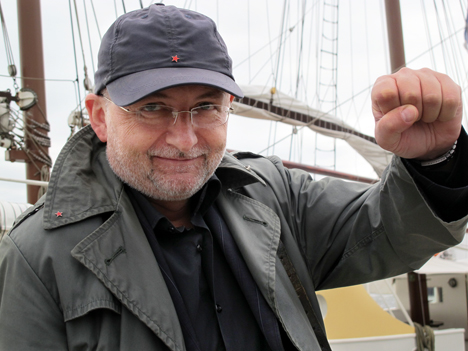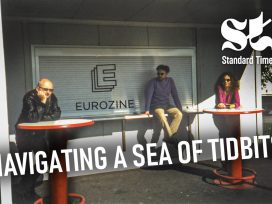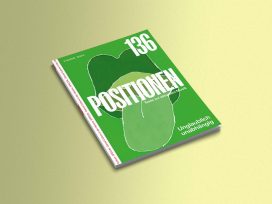I first met him at an international conference seven years ago. It was impossible not to notice him. His bald head was topped with a vaguely Maoist military cap adorned with a little red star; his shirt also had a uniform-like appearance and was decorated with diverse badges and insignia, mainly communist in style. He was assertive and wouldn’t shut his mouth.
I like weirdoes and independent thinkers, but this guy looked and acted more like a mascot. Later, however, I learnt that Walter Famler is no weirdo, but a respectable man who fulfils many functions. Gradually, we became friends. I was impressed by his courage and straightforwardness, but he was also a puzzle to me that I wasn’t able to resolve. I was learning more and more about him, but the individual fragments didn’t really fit together and didn’t make much sense.

Walter Famler. Photo: Nadine Blanchard.
At first glance, of course, there are those communist badges, but otherwise, Walter Famler looks in many respects like a quintessential character of middle-class life. He owns a spacious apartment in the centre of Vienna and a countryside residence in eastern Slovenia. He also owns several cars; in fact, he is a car collector. But his obsession with collecting does not end there: he has a huge library filled with precious prints, just as huge a collection of records, and a collection of musical instruments. The walls in both his residences are covered with high-quality art.
Similarly, as far as his career and contacts are concerned, he is a man who lives mostly among élites. He is director of the prestigious Alte Schmiede cultural centre in Vienna, and the editor-in-chief of the Viennese cultural journal Wespennest. For many years, he was an active member of the Austrian Social Democratic Party. When he walks or rides his bike through the streets of Vienna, many people greet him, including politicians from the highest levels of government.
But he doesn’t really like politicians. Even though he has the same initials as the current Austrian chancellor and does not mind shaking hands with him, he also calls him a traitor who sold out on the principles of social equality to capitalists. He asserts that private property is an evil, and that accumulation of private property is the worst evil of all. He is a sworn atheist, but after a short debate, it becomes clear that his god’s name is actually Karl Marx. Austria, in his view, is a country that has never overcome its Nazi legacy; he sees Nazis and the children of Nazis everywhere, to the extent that he may even sound a bit paranoid. By the way, his family background too is somewhat tainted by a Nazi heritage, and it is not impossible that all his anger and radicalism are simply manifestations of the conflicts taking place in his own heart.
At one point, it occurred to me that he might actually serve as a key to understanding the psyche of western European leftist activists of the 1970s and 1980s. It wasn’t that easy, though. Walter might be very talkative, but my occasional requests for an extended biographical interview had long been ignored or rejected. This year, however, he agreed – and not only because we had had a few glasses of wine and we found ourselves in a relaxed atmosphere. The thing was that Walter’s life had – quite unexpectedly – entered a transitional phase and a good talk was precisely what he needed. A few weeks later I set out to see and hear him talk, and try to assemble the shards of his life and opinions into a coherent whole.
It wasn’t sufficient, however, to go to Vienna; I had to go much further, to the village of Salovci, located in the little-frequented eastern part of Slovenia, not far from the Hungarian border. This is where, several years ago, Walter bought an old farm that he is now slowly turning into his countryside residence. It is an impressive compound, one that reflects good-taste and a friendly personality too; and it’s quite clear at first glance, that altogether, it must have cost a lot of money.
We sit at the huge table in the kitchen, on which there is Schnapps and smoked bacon. It looks very rural and old-world, and also very Austrian. Which fits, because we speak about Walter’s childhood and youth.
Although Walter now looks like a typical townsman, his childhood was very rural indeed. He was born in 1958 in the little town of Bad Hall in Upper Austria. His father worked as an electrician for the national distribution company OKA. Walter’s grandfather played an important role, both positive and negative, in Walter’s life. The grandfather was also an electrician and a countryman, but at the same time a politically active person. He joined the Austrian equivalent of the NSDAP as early as 1930, and didn’t leave politics even after 1934, when the party was banned after a failed coup d’état. For four years, he worked illegally and, when the party was restored after the Anschluss of 1938 and merged with its German counterpart, he enjoyed the status of a meritorious fighter. This might be the reason why he was arrested by the Americans after the liberation of Austria and was kept in a prisoners’ camp for one-and-a-half years. The conditions were not particularly harsh. He had to work, but could be visited and supported by his family. At the same time, he had the opportunity to meet some real Nazi bosses. It so happened that, when he was finally released, he was able to make use of an informal network that these people gradually built after the war. Once again, he obtained a job with the OKA, where he was responsible for the maintenance of a rural electricity facility. The job was rather formal; it provided him with material security and enough time to go to the pub and talk about old times.
There were many Nazis in Austria in the 1950s. The country’s upper echelons renounced its recent past in public, but no radical change took place in society itself. On the whole, the issue simply wasn’t talked about. If it was, most Upper-Austrian peasants maintained that “not everything was completely bad under Hitler”, whereupon a harsh critique of the contemporary situation followed. This is the milieu in which Walter Famler spent his childhood. He often went for holidays to his grandparents, whose standpoint was quite clear, even though they didn’t enter into political debates very often. The grandfather still kept a lot of Nazi literature in his loft, including illustrated magazines for young readers, and he didn’t really object to his grandson reading them. Sometimes, he made strange remarks. He observed his grandson intently and then said he looked very German. Walter didn’t understand and his grandfather didn’t explain further either. He liked uniforms, especially military uniforms, and Walter inherited this preference from him. Even now, he keeps an impressive collection of military caps, not Nazi, but mostly Soviet, British and American ones. Sometimes he puts them on. As a child, he wanted to be a soldier, a pilot if possible, and his grandfather approved of that.
Walter’s transformation from a child growing up in the conservative milieu of the post-Nazi Upper-Austrian countryside to a radical left-wing activist might have been partially determined by his inborn need to defy normalcy and go against the current. He rejected the political stance of those around him as early as the onset of adolescence. But it is not entirely clear how he made it with his Weltanschauung as far as the radical Left. He manifests a strong inclination towards overstatement and what he says cannot be always be taken entirely seriously. This probably also applies to his story of how he first came to know Lenin’s work. He says that, as a teenager, he joined a water polo team and the high concentration of chlorine in the pool-water made him lose his hair very early in life. A devoted Beatles fan, he was desperate, because nothing was more important to him than a proper hairdo. His father, obviously more open-minded than the grandfather, tried to console him: “Don’t worry, Lenin was bald too, and see what he achieved.” Walter hadn’t heard much about Lenin, but now he looked him up in an encyclopaedia and gradually became acquainted with his political writings. In any case, Lenin became for him an example to follow. He started to be politically active, first as a grammar school student, when he joined the Social Democratic Party’s youth organization and encountered the unionist movement. But even here, he felt a certain alienation. At a party conference, for instance, his speech was interrupted by a union boss from the steelworks in Linz, who told him plainly that people like him end up in the blast furnace of their factory. This was certainly a shock: having broken with his rural background, his fellow workers wanted to throw him into an oven. The feeling of alienation and inappropriateness continued to grow in his heart.
In fact, his whole life could be interpreted as a series of events that alienated him from other people. First, his grammar school studies isolated him from the rural setting of his childhood. Subsequently, his leftwing opinions led him to break with the middle-class world of the small town. He came across as too radical among social democratic unionists, whose compromises, cultivated according to the party line, he constantly questioned. And he also felt ill at ease among leftist intellectuals for whom, he says, ideas of social change comprise nothing more than a theoretical game and a means of building their media image. Once he compared himself to a “lone rider”: he grimaced a bit over this Hollywood cliché, but it is clear that the simile fits. He considers himself a professional revolutionary, but he is in fact a professional troublemaker. He simply likes inciting other people.
However, after finishing grammar school, a promising opportunity arose for him to start a political career. The party informed him that, although he was a bit strange, he also manifested a certain potential and so, if he wanted, he could study at the party’s academy. This would in turn open doors to political posts and possibly even the federal parliament. But Walter could only reject this well beaten track. Instead, he moved to Vienna and enrolled at the university for a degree in classics. His plan was to go back to his home in Upper Austria one day and engage in political work from the bottom up. But he wasn’t going to indulge in studies too much, as became clear to him upon first entering the students’ residence. In the 1970s, political life in western Europe was still rather tumultuous. The residence’s spacious lobby abounded with campaigners showering passers-by with flyers and fiery speeches: Trotskyists, Maoists, communists, social democrats… Walter joined in without hesitation. The residence officially belonged to the social democratic party, but the students enjoyed a high level of self-administration. They elected their own committees to decide on all the important issues. Even though these were mainly practical matters connected with the facility’s everyday operation, the decision-making process was politically highly charged. Walter was first elected speaker of one floor – showing a high level of political intelligence in the process. As soon as he saw the building for the first time, he realized that he had to find a room for himself in one of the upper floors, which were substantially smaller than the lower floors. This meant fewer accommodated students and, consequently, an easier path to power. Later, he and several colleagues staged a coup against the administration and seized control of the whole building. The insurgents enforced several measures that made the way the building operated more efficient, but they dedicated most time to campaigning. This is when Walter first defined himself as a professional revolutionary, or maybe decided that he wanted to become one. The group was very active. They organized lectures, literary readings and debates, they showed movies and even published their own newspaper. But not all students complied; many simply wanted to focus on their studies. They avoided public spaces and ignored the revolutionary regime’s activities. This way, Walter came to learn an important lesson: it is easy for a revolutionary to identify the enemy, but it is much more difficult to work with the masses on whose behalf they supposedly act. This discovery, evidenced several times throughout history, has strained many a political activist.
Walter’s studies went downhill too. The career of Latin teacher wasn’t really compatible with the model of professional revolutionary and, besides, political work took up all his time. For about a year, he tried to study law, but then gave up his studies completely because – as he now says – “your gun is your best lawyer.” By the way, although guns were the rage among young radicals at that time, it may be that the direction his career next took was merely a coincidence.
The fledgling revolutionary’s life was suddenly invaded by feelings – another problem activists of his kind sometimes face. These people often view the world solely through the prism of ideology and the discovery that certain things defy a given ideological schema often has terrible consequences. Walter fell in love with a Turkish student, a girl from a respectable Kemalist family. It was so serious that he threw his political career away and went after her to Istanbul, planning to stay in Turkey forever. This prospect was definitely tempting. He would become a member of an affluent family with good contacts and would probably spend the rest of his life in luxury. But at the same time, he would betray his vocation. In Istanbul, he let his hosts know what he thought about their life and kept speaking about the necessity of a proletarian revolution. No wonder he was soon forced to move into a cheap hostel and the girl stopped seeing him: that which probably impressed her during her student’s life in Vienna made a different impression in conservative Istanbul.
Walter was desperate. When he realized the way things were going, he decided to hit the road again. He entered further into the heart of Asia; he tried to join a Sufi monastery and, when rejected, spent several months in the camp of Kurdish insurgents in the very east of Turkey. This is where he first touched a Kalashnikov and weighed a grenade in his hand. He had a romantic dream of laying down his life in the fight for the liberation of the oppressed Kurds; but when he first saw dead bodies, he got scared. And he sobered up. He forbade himself any further mourning for his lost love and returned to Vienna. But he didn’t give up his struggle; he merely changed weapons.
I asked Walter what he is struggling for. We were walking on a dirt road along the river near Salovci. For socialism, he answered briefly. What does that mean exactly? It’s quite simple: in Walter’s interpretation, socialism means universal access to healthcare, jobs for everybody, a wage ceiling, high inheritance taxes in order to prevent the accumulation of property and so on. It sounds quite simple; these are, in fact, the common principles of the welfare state. So why all that radicalism, all that invocation of world revolution? Isn’t it possible to achieve much more through negotiations?
Walter says that he’s a man of radical theory, but moderate practice. A political radical lives at least partially in an unreal world; they follow their idea, but it blinds them to an extent, and they can’t really perceive the world around them. A practical solution is always the product of a compromise in the social democratic spirit. But it is necessary, at the same time, to preserve one’s radical thinking. A radical is also a man who has the guts to see things as they are, speak about them and possibly fight against them. And the right level of compromise can’t be achieved in practice if we relinquish our radical goals.
How does he see all the radical attempts to rectify the world that have ended up pitiful failures or, worse, in disastrous bloodshed? He categorically refuses to admit that there could have been anything fundamentally wrong about – let’s say – the October Revolution. It was a valid attempt, he says, which went wrong in the end, but this doesn’t decrease its value in any way. When I take the gulags and mass persecution as the basis of a counterargument, it is as if I were flogging a dead horse. Lenin didn’t establish the gulags, and the gulags were not a product of the revolution. Then he admits that even Lenin did actually found a few gulags of his own, but explains this away as the result of having to do something about the problem of counter-revolutionaries. “Because”, he says “I have no illusions about the revolution and in general I stand against violence, because it’s always better to negotiate; but sometimes it happens that people start shooting and then negotiations are not possible. And the situation in Russia in 1917 was the product of the existing system, and that system was criminal and oppressive, like any capitalist system founded on the principle of personal profit which will ruthlessly rid itself of anybody it no longer needs.”
He stops and looks at me: “You agree with me because you know, from your own experience, that I am right.” When he sees my baffled eyes, he adds, just in passing: “Or do you really think this system needs a guy like you?”
But what is so bad about this system? Aren’t we actually well off compared to other stages of human history? He shakes his head. This is a system in which you can only be successful if you exploit other people. It’s true that years ago, the longed-for compromise was nearly achieved, but all the achievements are now slowly disappearing. Today, nobody believes in solidarity and the welfare state. Social inequality and poverty are growing. The populist Right is reaching out for power throughout Europe and rich entrepreneurs are buying whole political systems. People don’t protest because they are growing more and more isolated from reality. When they go to an art gallery, they look at paintings through their iPads, and their social life takes place on Facebook.
Facebook is obviously a sore point in Walter’s vision of the world: when he speaks about it, his face gets red with anger. “Facebook has completely destroyed the meaning of the word friend. And also of the word face. I have my face, and I don’t need a book for it!” he spits out. Then he calms down: “I’m not opposed to progress and technical innovation, but I really distrust all those strange tools which don’t help people in any way; on the contrary, they rob people of all responsibility and reduce them to an infantile condition. People shouldn’t chase so much after technical inventions; they should stop and take the time to think. Then they would realize how bad it looks for them.”
But it doesn’t look so bad for Walter himself, at least as far as his material situation is concerned. We are sitting in his studio, a beautiful modern extension that he added to the existing farm; we are surrounded by old books and records, art and musical instruments. He tells me about his career after he came back from his Turkish adventure. He never went to school again. Soon, he started working for Austrian radio and became the editor-in-chief of a newspaper published by the Federal Students’ Union. Then he broke with the Union and for two years published the newspaper on an independent basis. At the beginning of the 1990s he became the editor-in-chief of the cultural journal Wespennest and, ten years later, the chairman of the Alte Schmiede cultural centre. In addition to which, he was still active in the Social Democratic Party and the unionist movement. His career took a moderate course and didn’t really differ from that of other Viennese intellectuals. In fact, he joined the mainstream. But he didn’t feel at ease there. Intellectuals in cultural and literary circles annoyed him with their haughtiness and their bogus leftism; politicians and unionists, on the other hand, offended him with their corruptness and inability to grasp the problems with which society is faced. He was alone. He was neither a worker, nor an intellectual; neither a politician nor a unionist. Still, he wanted to be all these things combined. And, at the same time, he wanted to goad all these people and remind them of their complacency. He went through many conflicts but he also wanted to have fun. He founded the Dadaistic movement KOSMOS, whose goal is to remind the world of the legacy of Yuri Gagarin and especially “to spread Gagarin’s smile over the faces of the women of the whole world.” He was dissentious and controversial, but people – at least those I know – always liked him. He was considered a merry and original person whose opinions were often disturbing, but who was definitely a lot of fun.
And he has always been fun, this I can confirm. Lately, however, Walter Famler has saddened a bit. He feels he is growing old. Of all his spectacular struggles, not one has led to victory. The revolution isn’t coming and none of his dreams are close to fulfilment. The Alte Schmiede, where he’s been working for ten years, is facing serious troubles. The insurance company that owns the building is planning to sell the site to developers for the construction of luxury apartments. The negotiations haven’t been concluded yet, but Walter lost the first round and the prospects are gloomy. Wespennest too – just like any other cultural journal today – is facing financial troubles and has been forced to reduce its periodicity. And the radical thinker’s life has been once again invaded by passion.
There is a large painting on the wall in the studio where we are sitting, of a landscape comprising a vast meadow stretching out towards a horizon adorned with two simple wooden structures at the very top of the painting. The scene looks empty and bleak. But the viewer can’t help feeling that this painting reminds him of something. And indeed: it is a copy of Christina’s World by Andrew Wyeth, an iconic work of American realism. The only difference is that Christina, the crippled girl seated on the lawn in the forefront, is missing in this version. What remains is the empty meadow stretching towards the horizon. When it dawns on me, I look at him in surprise. He nods and chuckles sarcastically.
The thing is that about three years ago, Walter fell head over heels in love with Swiss critic and writer Christine Lötscher. He was well over fifty at that time, but the feeling was so intense that he didn’t hesitate to shatter the stable relationship in which he had lived for many years. He says he went completely crazy. Furthermore, the knowledge that there are things he can’t control literally crushed him. The story resembles more than a little that of the beautiful Turk; in fact, Walter admits that the two femmes fatales of his life were very much alike. I remember that when I first learned the big news I was quite annoyed because I really liked his previous girlfriend. This might be why I dared to make a somewhat unbecoming joke in an e-mail I sent him: I quoted from Pavel Kohout’s famous letter to Vladimir Ráz: “This is not what a comrade should do to a comrade…” Later, when we met, he was still baffled by the course of events. He never understood my quote as a joke; on the contrary, he took it seriously, but he didn’t even think of defending himself. “Indeed, this is not what a comrade should do to a comrade,” he muttered. But he couldn’t help it. As a comrade, he had probably failed, but as a human being he acquired new interesting contours in my eyes.
However, the new relationship didn’t last long. Christine, a professional woman with her own successful career, wasn’t willing to stand the intensity of Walter’s personality and left him after two years. Walter stayed. He now seems to be living in Christina’s world without Christina; the painting hanging on the wall of his studio (he bought it from the Viennese painter Johanna Braun) symbolizes his situation.
At the age of fifty-five, the professional revolutionary Walter Famler has perhaps reached his limits. When I ask him (now in Vienna, in “one of the few pubs in this city yet to be contaminated by that terrible music!”) what he achieved through all his efforts, he shrugs. Probably nothing; the world goes exactly against what has always hoped for. The prospect of radical change hardly seems realistic to him now – not that this, he adds again, decreases at all the legitimacy of any efforts aimed at achieving such change. If there is anything that could be considered a success, then maybe it’s the very fact that he has survived. But he is tired. He feels the pressure of the age and would like to hand the torch over to someone younger. But a successor will be hard to find because the world really has changed and Walter doesn’t feel at home in it any longer. Next year, he plans to leave Wespennest and, thereafter, the Alte Schmiede too, as soon as the problems it is now facing are settled. He will withdraw into his shelter in the countryside of Salovci, where he will indulge in thinking and writing.
But it is hardly conceivable that a man of this kind could ever just withdraw. Maybe he only has to recover from the losses he has recently suffered, overcome his melancholy and find some new strength. Like a hunted animal hiding in the shrubs for a moment to lick his wounds. It will not take long, I am quite sure.
By the way, first manifestations of a new chapter in Walter’s life have already popped up. In summer, he was approached by Der Wandel, a group of young leftists who decided to vent their disappointment about the existing situation in Austria by founding a new political party. Walter didn’t hesitate long. He took an active part in the campaign for the parliamentary elections, contributed to strategy and made speeches at political meetings. “They are too soft, too compromising”, he says, “but they have what I am missing in terms of social democracy. Youthfulness, revolutionary spirit, a genuine longing for a change.” I don’t know whether it was he who recommended the stern modernist campaign posters with quotations from Bertold Brecht. “One day, citizens will pay not only for the words and deeds of politicians, but also for the outrageous silence of the majority”, says one of them. Whatever we think about a campaign carried out in this way, everybody must admit that there’s something appealing about a party that dares to approach potential voters with threats.
In the Austrian parliamentary elections at the end of September 2013, Der Wandel gained 3,051 votes. “It’s a success,” says Walter Famler. “Not a big success, but a good start. If they were not so soft, it might have been even better.” Brecht’s threats on the posters were probably too vague and impersonal. But the unsatisfactory result only confirms one thing. If you are ambitious, then you usually set goals that are beyond your reach. “I have no illusions”, says Walter, “a fully humane and just society is probably unattainable, it is some kind of dream. But if we give up this dream, then humanity as such is finished. We can only do one thing: set the goal and then go, go, go…”







